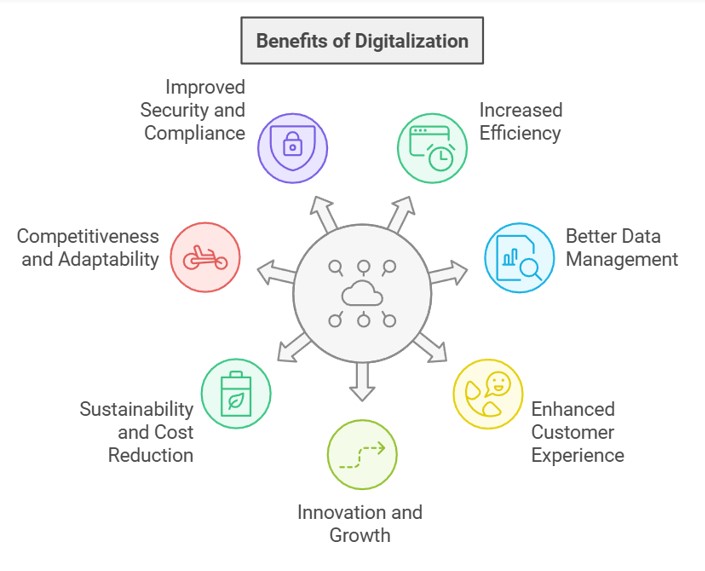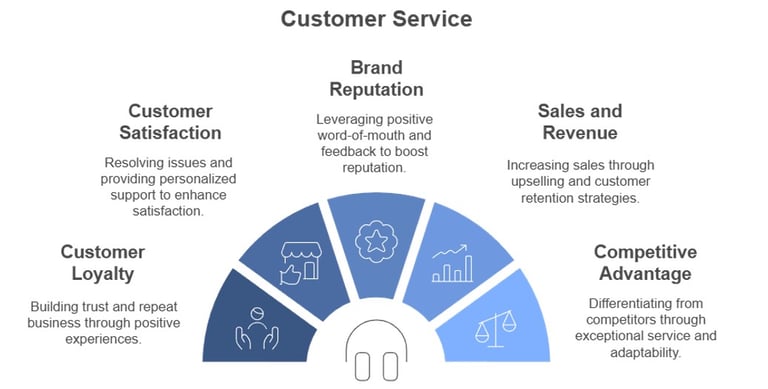Digitalization
The next step in the digital evolution. It refers to using digital technologies and digitized data to impact how work gets done, transform how customers and companies engage and interact, and create new digital revenue streams. It's about leveraging digitization to improve processes, enhance productivity, and foster innovation
Customer Service




Innovation and Growth
New Business Models: Digitalization allows for the creation of entirely new business models (e.g., e-commerce, subscription services, online marketplaces).
Scalability: Digital solutions can easily scale as a business grows, allowing companies to reach a wider audience without significant infrastructure costs.
Sustainability and Cost Reduction
Reduced Paper Usage: Digital documents and e-signatures help cut down on paper, contributing to environmental sustainability.
Lower Operational Costs: By reducing the need for physical storage, transportation, and manual labour, digitalization can lower overall costs.
Remote Work Capabilities: Digital tools support remote and hybrid work, reducing the need for office space and commuting.
Competitiveness and Adaptability
Staying Relevant: In a digital world, companies that adopt technology can stay competitive and adapt quickly to market changes.
Agility: Digital businesses can respond faster to customer needs and industry trends, giving them a competitive edge.
Improved Security and Compliance
Data Security: Digital systems can include advanced security features like encryption, access controls, and monitoring to protect sensitive information.
Regulatory Compliance: Digital tools help businesses comply with industry regulations through automated reporting and secure data handling.
My profesional goal is to be able to help companies and organizations to become part of digital evolution. I am also very passionate about customer service field and sports.
Being part of Projects Teams that help improve the Community, it gives me a great feeling of achievement.


Increased Efficiency and Productivity
Automation: Routine tasks can be automated, reducing manual labor, minimizing errors, and saving time.
Streamlined Processes: Digital workflows and tools make it faster to process information, complete tasks, and deliver services.
Improved Resource Management: Digital systems help monitor, allocate, and optimize the use of resources like inventory, time, and labour.
Better Data Management and Insights
Data Collection and Analysis: Digitalization enables the collection of large amounts of data. With analytics, organizations can gain insights that drive better decision-making.
Predictive Capabilities: Analysing trends and patterns allows businesses to forecast future demands and adjust strategies proactively.
Enhanced Customer Experience
Instant Access: Customers can interact with businesses anytime, anywhere through digital channels (e.g., websites, apps).
Personalization: Companies can tailor their services and products based on user data, providing a more personalized experience.
Improved Communication: Digital platforms like social media, chatbots, and email enable direct, real-time communication.
The assistance and advice provided by a company through phone, online chat, mail and e-mail to those who buy or use its products or services. Each industry requires different levels of customer service, but towards the end, the idea of a well-performed service is that of increasing revenues. The perception of success of the customer service interactions is dependent on employees "who can adjust themselves to the personality of the customer". Customer service is often practiced in a way that reflects the strategies and values of a firm. Good quality customer service is usually measured through customer retention.
Building Customer Loyalty
Positive Experience: Good customer service makes customers feel valued and respected, increasing their likelihood of becoming repeat buyers.
Trust and Relationship: By addressing issues promptly, businesses build trust, which helps foster long-term relationships.
Enhancing Customer Satisfaction
Problem Resolution: Effective customer service resolves issues quickly, reducing frustration and improving overall satisfaction.
Personalized Support: Tailored assistance helps customers feel understood, increasing their satisfaction with the brand.
Boosting Brand Reputation
Word-of-Mouth Marketing: Happy customers are more likely to recommend the business to others, increasing positive word-of-mouth and brand awareness.
Public Feedback: Great customer service can turn negative experiences into positive reviews, especially on social media and review platforms.
Increasing Sales and Revenue
Upselling and Cross-Selling: Customer service agents can suggest additional products or services, leading to increased sales.
Customer Retention: It’s more cost-effective to retain existing customers than to acquire new ones, and good customer service helps keep customers coming back.
Providing a Competitive Advantage
Differentiation: Exceptional customer service can set a company apart from its competitors, especially in industries where products are similar.
Adaptability: By listening to customer feedback, businesses can quickly adapt their services and products to meet customer needs
Improving Business Operations
Customer Insights: Customer service interactions provide valuable feedback about common issues or suggestions for improvement, helping businesses refine their offerings.
Efficiency: Streamlined customer service processes, like automated responses and live chats, can handle inquiries faster, reducing wait times.
Enhancing Customer Experience (CX)
Convenience: Offering multiple channels for support (e.g., phone, chat, email, social media) makes it easier for customers to get help when needed.
Empathy and Human Touch: Customer service adds a human element, allowing for empathetic communication and problem-solving




Suceava
Location: North Eastern Romania, Bucovina Region
Area: 20 sq. miles (52 sq. kilometers)
Elevation: 1070 - 1120 ft. (325 - 340 meters)
Population: Approx. 100,000
Personal Gallery - Some Memories that i dearly hold close to my heart











